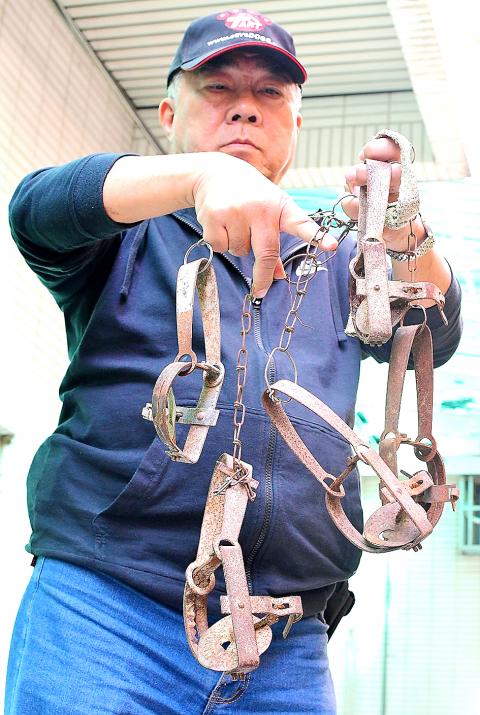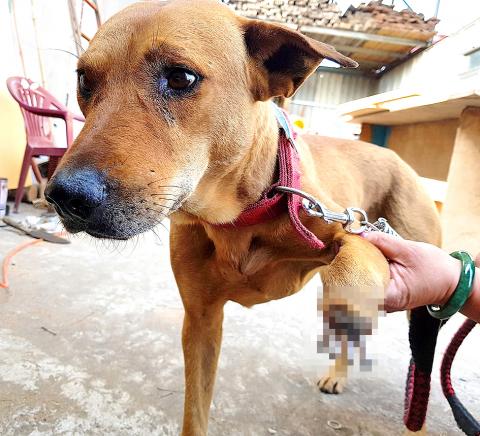Members of the Animal Rescue Team Taiwan are calling for better enforcement of laws prohibiting the use of animal traps, after three dogs in Kaohsiung lost their legs to the devices last week.
One of the injured dogs, which lost a front leg, was nursing a litter when it was found, the team said.
Laws should be amended to allow the city’s Animal Protection Office to more effectively seize traps to prevent a recurrence of such “heart-wrenching” incidents, they added.

Photo courtesy of Animal Rescue Team Taiwan
Last week, the team was called to rescue three dogs in the city’s Liouguei (六龜) and Tianliao (田寮) districts, and Singda Harbor (興達港), and rushed the dogs to surgery to save their lives, the team said.
Article 14-2 of the Animal Protection Act (動物保護法) prohibits the manufacture, sale, import, export and display of animal traps unless authorized by the central government.
The act was amended on June 29, 2011, because the authorities said the traps were a “cruel implement of slaughter and should forever disappear from Taiwan,” rescue team spokesperson Anthony Ni (倪京台) said.

Photo courtesy of Animal Rescue Team Taiwan
Despite the amendment, the number of cases handled by the team involving cats and dogs mutilated by traps has not dropped over the past seven years, he said.
Only 10 percent of animals caught in traps have been saved, with a majority dying from sepsis, he said.
Protected animals also get caught in the traps, Ni said, citing reports of leopard cats and Formosan bears coming in contact with the devices.
Moreover the Animal Protection Act only prohibits the manufacture, sale, import, export and display of traps, but not ownership — a legal loophole that many people exploit, he said.
“Faced with the threat of their traps being seized, some people simply tell authorities that they had bought the traps long ago and that they are only keeping them in storage,” he said.
In 2016, the Kaohsiung City Government was the first in the nation to introduce a municipal ordinance that closed this loophole by banning ownership of traps, he said.
City authorities informed the local hardware association about the ordinance and conducted random inspections of association members, he said.
However, the law is difficult to enforce in remote mountain communities, he said.
Every year the Kaohsiung Animal Protection Office offers free vaccination shots for rabies and other diseases to pet owners in remote rural communities.
In the process of administering vaccines it usually encounters pets with severed limbs, which their owners say were caused by the pets running off into the mountains and forests, the office said.
“Some of the traps are made by people on their own. This is just something you cannot guard against,” Ni said.
The office cooperates with local government offices and civic animal protection groups to search for traps in the mountains, and posts signage along mountain trails to remind the public that traps are illegal, he said.
The Animal Protection Act stipulates that those found making, selling, importing, exporting or exhibiting traps may be fined up to NT$75,000 (US$2,436), while Kaohsiung’s municipal ordinance prohibiting trap ownership stipulates a fine of NT$15,000.
If the use of a trap results in the death or debilitation of an animal, the owner of the trap may be fined up to NT$2 million and face up to two years in prison, as stipulated in Article 25 of the act, Animal Protection Office director Yeh Kun-sung (葉坤松) said.

Chinese Nationalist Party (KMT) Chairman Eric Chu (朱立倫), spokeswoman Yang Chih-yu (楊智伃) and Legislator Hsieh Lung-chieh (謝龍介) would be summoned by police for questioning for leading an illegal assembly on Thursday evening last week, Minister of the Interior Liu Shyh-fang (劉世芳) said today. The three KMT officials led an assembly outside the Taipei City Prosecutors’ Office, a restricted area where public assembly is not allowed, protesting the questioning of several KMT staff and searches of KMT headquarters and offices in a recall petition forgery case. Chu, Yang and Hsieh are all suspected of contravening the Assembly and Parade Act (集會遊行法) by holding

PRAISE: Japanese visitor Takashi Kubota said the Taiwanese temple architecture images showcased in the AI Art Gallery were the most impressive displays he saw Taiwan does not have an official pavilion at the World Expo in Osaka, Japan, because of its diplomatic predicament, but the government-backed Tech World pavilion is drawing interest with its unique recreations of works by Taiwanese artists. The pavilion features an artificial intelligence (AI)-based art gallery showcasing works of famous Taiwanese artists from the Japanese colonial period using innovative technologies. Among its main simulated displays are Eastern gouache paintings by Chen Chin (陳進), Lin Yu-shan (林玉山) and Kuo Hsueh-hu (郭雪湖), who were the three young Taiwanese painters selected for the East Asian Painting exhibition in 1927. Gouache is a water-based

Taiwan would welcome the return of Honduras as a diplomatic ally if its next president decides to make such a move, Minister of Foreign Affairs Lin Chia-lung (林佳龍) said yesterday. “Of course, we would welcome Honduras if they want to restore diplomatic ties with Taiwan after their elections,” Lin said at a meeting of the legislature’s Foreign Affairs and National Defense Committee, when asked to comment on statements made by two of the three Honduran presidential candidates during the presidential campaign in the Central American country. Taiwan is paying close attention to the region as a whole in the wake of a

OFF-TARGET: More than 30,000 participants were expected to take part in the Games next month, but only 6,550 foreign and 19,400 Taiwanese athletes have registered Taipei city councilors yesterday blasted the organizers of next month’s World Masters Games over sudden timetable and venue changes, which they said have caused thousands of participants to back out of the international sporting event, among other organizational issues. They also cited visa delays and political interference by China as reasons many foreign athletes are requesting refunds for the event, to be held from May 17 to 30. Jointly organized by the Taipei and New Taipei City governments, the games have been rocked by numerous controversies since preparations began in 2020. Taipei City Councilor Lin Yen-feng (林延鳳) said yesterday that new measures by